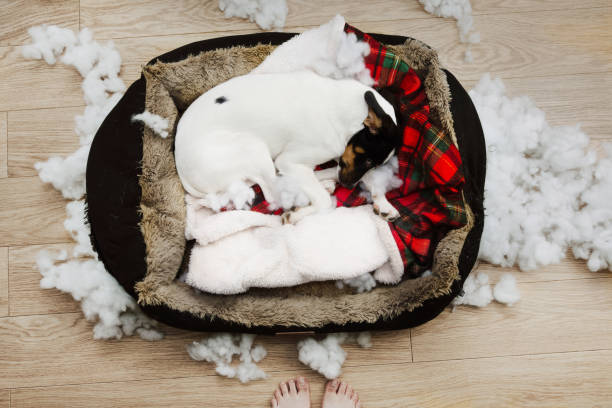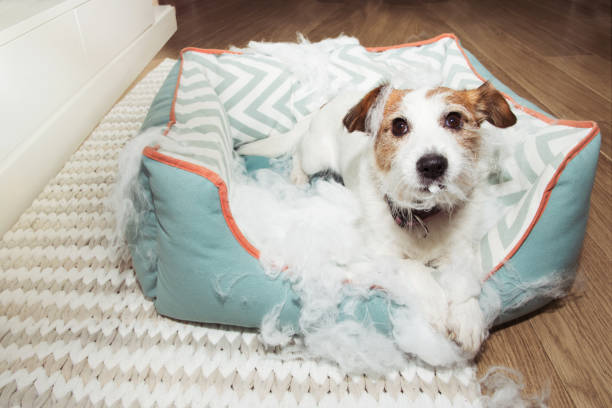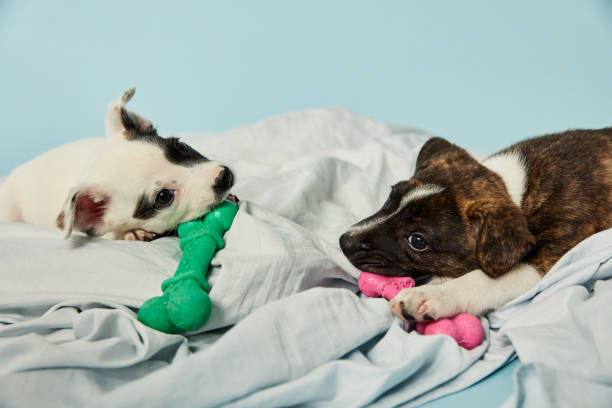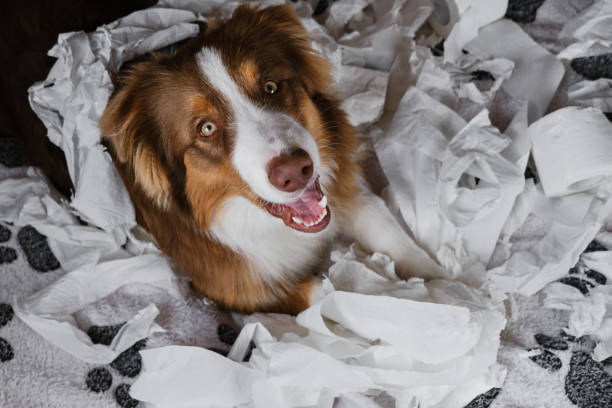Learn How To Stop A Dog Rom Chewing His Bed . Discovering that your dog has destroyed the expensive plush bed you bought for him can be upsetting. Understanding why dogs chew on their beds is essential to convincing your little dog to cease the behavior. In light of this, continue reading to learn how to prevent dogs from biting your bed.
What makes dogs gnaw on their beds?
Let’s first examine the various reasons why dogs chew on their beds before we explain how to stop them from doing so:

Boredom and anxiety
One of the biggest causes of dogs chewing on their beds is this. It’s important to remember that most dogs need stimulation for their bodies and minds, regardless of how busy your home life is or how frequently you are away from it. If your dog isn’t given enough exercise and has few toys to play with, it may be destructive out of boredom or to seek its owners’ attention. Separation anxiety may also have an impact on this need for attention. Separation anxiety affects some dog breeds more than others.
Hunger
A dog on a diet that limits calories may destroy or gnaw on objects to find additional food sources. Dogs often chew on things that have a food-like scent or are somehow connected to food. Although this shouldn’t happen with a dog bed, it is possible, given that hunger can result in such a reaction.
Underlying medical conditions
If the issue cannot be linked to your dog’s regular activities providing insufficient enrichment, there is always the possibility that an underlying health condition is to blame. Suppose you suspect there may be a problem, such as a digestive issue or a compulsive chewing disorder. In that case, it is a good idea to talk to your veterinarian.
Teething
If your pet is a puppy, he may be teething and chewing on his dog bed. A puppy will instinctively chew when he is between the ages of four and six months to aid his teeth as they grow. Your dog might be attempting to soothe the soreness in his gums and teeth.
Exploration and Gut Feeling
In addition to the previously mentioned reasons, many dogs also chew their beds while exploring. Just like babies, pups explore most of the environment via their tongues. This tendency may evolve as a means for your dog to attempt to understand the environment around them better. Just like cats clawing, chewing is part of the instinctive behavior of a dog. Because of this, it’s critical to control your expectations about your dog’s overall chewing behavior.
Enjoyment
It could easily be that your dog enjoys chewing his bed! It might taste, look, and smell fantastic.
How to prevent dogs from chewing on beds
The strategy you should use to discourage dogs from chewing their bedding depends on the motivation behind the behavior. As previously stated, the only thing you should do in this situation is to take your dog to the vet if you think it might have a health problem. What about other canine chewing behaviors?
Walking your dog
If you suspect your dog is bored and chewing on his bed, it can also display other signs of agitation and displeasure. Exercise your dog more—one of the best things you can do in this situation. It’s crucial that your dog receives enough exercise and is not left alone for an extended period, especially if he’s being created. Exercise him vigorously for 30 to 60 minutes before the event. Additionally, you must ensure that your dog never spends more than eight hours in a crate. Find a dependable friend or neighbor who will allow your dog out for you if you cannot do so yourself.
Having dog toys accessible
There are further actions you can try to convince your dog to quit chewing on his bed. One is keeping your dog occupied when you’re away from home with simple-to-access dog toys. Give the interactive dog toys you can load with food or treats, stuffed animals, and chew toys. These techniques guarantee that your dog’s mind is engaged while working toward his reward.
Additionally, we advise you to keep up with puppy redirection training. Give your dog a sanctioned chew toy if he is an older dog and is still gnawing on his bed.

Utilize a spray deterrent.
You can also use a deterrent spray to curb your dog’s obsession with eating his bedding. But don’t just use the spray by itself. You’ll need to locate an activity that keeps your animal companion busy. He has to be entertained for him to be happy and healthy overall.
It is a good idea to apply a small repellent on some cotton wool or tissue while using it. Put this in your dog’s mouth gently. Your dog will be able to taste it if you do this. If he doesn’t like it, he will spit it out. You will know whether your dog finds the excrement to be unpleasant. He can slur his words, shake his head, or even throw up. There is no chance that your dog will ever pick up the cotton wool or tissue again.
Ideally, your dog will have made the association between the deterrent’s fragrance and taste, increasing his propensity to stop chewing on objects with the same smell.
This repellent can then be sprayed on objects you don’t want your dog to chew. Your dog has been chewing on everything and the dog bed.
Apply the deterrent every day for the next two to four weeks. However, you must understand that deterrents by themselves can never be sufficient. They can be quite helpful in the short term, but if you want your dog to stop chewing for good, you’ll need to take other steps.
Changing the dog bed for a tougher one
Your equipment may need to be upgraded as well. Did you know that chew-proof dog beds are available? Some canines enjoy ripping the product filler out. Despite your best efforts, you can’t seem to stop it. In this situation, it is advantageous to look for extra-durable dog beds with more layers and stronger materials to endure the naughtiest chewers.
Reduce confusion
Ultimately, you must ensure that your dog knows what objects he should and shouldn’t chew. It is crucial to keep things clear. Many pet owners give their dogs household items they no longer want, such as discarded cushions and worn-out shoes. However, unlike the cushions on your sofa and the shoes you still wear, your dog won’t be able to tell the difference between these cushions and shoes. You cannot reasonably expect your dog to be able to distinguish between the two.
Don't yank a stressed-out dog's bed because they did it.
What if your dog is anxious and is gnawing on his bed? Stress and separation anxiety are frequently linked to destructive chewing. The cause of your dog’s persistent chewing on his dog bed may be anything making him feel uneasy or anxious.
When dealing with this type of destructive chewing, you need to be persistent and go above and above. Toys, redirection, and deterrents will need to be improved independently.
Under any circumstances, we do not advise disciplining your dog. The likelihood is that punishing your dog with methods like yelling, paddling, or muzzling will make the chewing worse, especially if your dog suffers from acute anxiety.

Identify the source of the jittery behaviour.
What can you do to prevent your dog from nervously chewing his bed? The first step is finding out what circumstances are triggering your dog. Unfortunately, you could have little influence over some of these triggers. However, you’ll be in the best possible position to handle this once you know what is causing your dog to feel anxious.
For instance, some dogs may experience extreme anxiety and agitation near other pets or young children. Set new boundaries if this is the case to give your dog a sense of security.
Many dogs will display noise-related anxiety, which is very difficult to manage. After all, you can’t stop neighbourhood traffic, fireworks, thunder, etc.! However, there are some things you can do, such as shifting your dog’s bed to a different area of your house. Asking family members to remain calm whenever there is a noisy disruption is also a good suggestion. Your dog’s situation will only worsen if you add to the uproar.
Invest in some dog pheromones.
Utilizing a synthetic dog pheromone product can be helpful in addition to identifying the triggers that make your dog act out. These are common and can be utilized in treating numerous nervous system disorders.
These items are available in various packaging types, such as individually wrapped wipes, sprays, plug-in diffusers, and collars. They don’t smell, and they replicate the relaxing hormones that mothers naturally give off to their puppies.
You will need to exercise patience when employing pheromone products. These products require monthly reapplication because they don’t function instantly. The key is consistency.
Think about behavioral therapy
Consider undergoing behavior counselling. The approach used in behavior treatment is more extensive. However, if your dog has extreme anxiety, it might be necessary. Consult your vet. They can suggest any local experts who can assist you with this.
How To Get A Dog To Stop Chewing Their Bed
1.Watch your dog.
Knowing your dog, including what they chew on and when they do it, is the first step. By doing so, you’ll be able to recognize their warning signs, preferences, and how long they intend to gnaw on their bed.
2.Purchase a suitable chew toy (or more)
It’s time to choose toys you’ll let your dog chew on now that you know what they’re chewing. This is crucial: you cannot stop bad behavior without providing a better alternative. Start by gathering a variety of toys. Usually, your dog will have a few favorites from that list. It’s crucial to provide your dog with appealing chew toys that they will like. Try to choose new toys comparable to the ones they prefer if you need more in the future.
3.Disrupt your dog when they start chewing its bed.
Keep a watch on your dog now that you have the new toys, but don’t give them to him. Call their name as soon as you notice them chewing on their bed. Praise them and offer the new item if you notice they are concentrating on you.
4.Change your behavior.
Redirection is the process of replacing the bed with a permitted toy. This simple method relies on consistency. Get their attention and offer the toy each time they attempt to chew on the bed. This must be done each time for it to be effective. Tell any further residents to follow suit if there are any. Working together, we can teach negative behaviour to go away.
5.Congratulate them for gnawing on their toy
Your dog will rapidly get that chewing on the toy is permitted thanks to the redirection. You want them to understand that you find it amusing when they’re gnawing on their toy. In this manner, they’ll do it more frequently, and it’ll develop into a new habit.
Even if it’s not the identical item you trained them with, give your dog praise and attention whenever you notice them chewing on a toy. This will stress the rule that chewing on toys is acceptable, but not on mattresses.

Final Reflections
Any punishment won’t stop your dog from chewing on the bed and might even make worried dogs more agitated. Teach your pet interesting mental tricks to keep them from engaging in boisterous behaviour.
To satisfy your dog’s hunger and reduce bed chewing, provide reasonable intervals for munching. You can quickly see positive behaviour in your dog if you correct their behaviour and temperament and maintain their training.


Greetings! Very useful advice within this article!Thanks a lot for sharing!
I have to thank you for the efforts youve put in writing this blog. Im hoping to check out the same high-grade blog posts by you later on as well. In fact, your creative writing abilities has encouraged me to get my own website now 😉